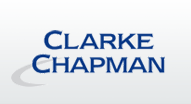Clarke Chapman
 | |
| Company type | Private |
|---|---|
| Industry | Engineering |
| Founded | 1864 |
| Headquarters | Gateshead, Tyne and Wear, North East, England, UK |
| Parent | Langley Holdings |
| Website | www.clarkechapman.co.uk |
Clarke Chapman is a British engineering firm based in Gateshead, which was formerly listed on the London Stock Exchange.
History
[edit]
The company was founded in 1864 in Gateshead by William Clarke (1831–1890).[1] In 1865 Clarke took in a partner, Abel Chapman,[1] and the two of them developed the business into one of the largest manufacturers of cranes and other mechanical handling equipment in the world. In 1870 two further partners joined the firm, Joseph Watson and Joseph Gurney.[2] The firm became known as Clarke, Chapman and Gurney. Joseph Gurney retired from the firm in 1882.[3] The firm subsequently formed a partnership with John Furneaux and Charles Parsons, and became known as Clarke, Chapman, Parsons, and Company. Parsons left the firm in 1889.[4]
By 1907 the firm manufactured an extensive range of ship's auxiliary machinery, mining plant, water tube boilers, and pumps.[5] Clarke Chapman became the main supplier of auxiliary equipment to the British shipbuilding industry before the First World War.[6]
In 1969 Clarke Chapman acquired Sir William Arrol & Co., a leading bridge-builder.[7]
In 1970 Clarke Chapman acquired John Thompson, a leading boiler making business based in Wolverhampton.[8]
In 1974 Clarke Chapman acquired the UK interests of International Combustion, a diverse group of heavy engineering businesses.[9]
The company merged with Reyrolle Parsons in 1977 to form Northern Engineering Industries plc[7] which itself was acquired by Rolls-Royce plc in 1989.[7]
The business continues today as part of Langley Holdings Limited which acquired it from Rolls-Royce in 2000.[10]
Ships using Clarke Chapman mechanical handling equipment include the RFA Wave Knight and the RFA Wave Ruler completed in 2000 and 2001 respectively.[11]
Operations
[edit]
The company trades under the names of Cowans Sheldon (railway cranes), RB Cranes (construction cranes), Stothert & Pitt (port cranes) and Wellman Booth (steel plant cranes).[12]
See also
[edit]References
[edit]- ^ a b "William Clarke 1831-1890". Gateshead Blue Plaques. Gateshead Libraries. Archived from the original on 28 January 2013. Retrieved 24 March 2012.
- ^ "Clarke, Chapman and Co". Grace's Guide. Retrieved 24 March 2012.
- ^ "No. 25179". The London Gazette. 19 December 1882. p. 6475.
- ^ "No. 25953". The London Gazette. 12 July 1889. p. 3796.
- ^ Clarke, Chapman; Co., Limited (1907). (Untitled product catalogue). Gateshead-on-Tyne: Clarke, Chapman & Co., Limited.
- ^ McGovern, T.; McLean, T. (2013). "The growth and development of Clarke Chapman from 1864 to 1914". Business History. 55 (3): 448–478. doi:10.1080/00076791.2012.745066. S2CID 153319725.
- ^ a b c NZR Cranes Archived March 3, 2016, at the Wayback Machine
- ^ Alstom John Thompson[permanent dead link]
- ^ Institute of Actuaries[permanent dead link]
- ^ "Bulk Materials International". Archived from the original on 14 November 2006. Retrieved 16 March 2008.
- ^ RFA Wave Ruler passing Round Tower
- ^ "Wellman Booth" (PDF). Piller. Retrieved 6 February 2022.
External links
[edit]- Official site
- Clarke Chapman History
- Partial list of the firm's early product literature
- "Clarke, Chapman and Co". Grace's Guide.
- "Clarke, Chapman and Co., company archives". Records. National Archives.

